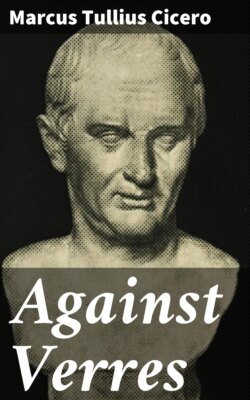Читать книгу Against Verres - Marcus Tullius Cicero - Страница 31
На сайте Литреса книга снята с продажи.
9
ОглавлениеTable of Contents
24Now, in order that Hortensius may not be able to employ any new sort of complaint, and to say that a defendant is oppressed if the accuser says nothing about him; that nothing is so dangerous to the fortunes of an innocent man as for his adversaries to keep silence; and in order that he may not praise my abilities in a way which I do not like, when he says that, if I had said much, I should have relieved him against whom I was speaking, and that I have undone him because I said nothing,--I will comply with his wishes, I shall employ one long unbroken speech: not because it is necessary, but that I may try whether he will be most vexed at my having been silent then or at my speaking now. 25Here you, perhaps, will take care that I do not remit one hour of the time allowed me by law. If I do not employ the whole time which is allowed me by law, you will complain; you will invoke the faith of gods and men, calling them to witness how Caius Verres is circumvented because the prosecutor will not speak as long as he is allowed to speak by the law. What the law gives me for my own sake, may I not be allowed to forbear using? For the time for stating the accusation is given me for my own sake, that I may be able to unfold my charges and the whole cause in my speech. If I do not use it all, I do you no injury, but I give up something of my own right and advantage. You injure me, says he, for the cause ought to be thoroughly investigated. Certainly, for otherwise a defendant cannot be condemned, however guilty he may be. Were you, then, indignant that anything should be done by me to make it less easy for him to be condemned? For if the cause be understood, many men may be acquitted; if it be not understood, no one can be condemned. 26I injure him, it seems, for I take away the right of adjournment. The most vexatious thing that the law has in it, the allowing a cause to be twice pleaded, has either been instituted for my sake rather than for yours, or, at all events, not more for your sake than for mine. For if to speak twice be an advantage, certainly it is an advantage which is common to both If there is a necessity that he who has spoken last should be refuted, then it is for the sake of the prosecutor that the he has been established that there should be a second discussion. But, as I imagine, Glaucia first proposed the law that the defendant might have an adjournment; before that time the decision might either be given at once, or the judges might take time to consider. Which law, then, do you think the mildest? I think that ancient one, by which a man might either be acquitted quickly, or condemned after deliberation. I restore you that law of Acilius, according to which many men who have only been accused once, whose cause has only been pleaded once, in whose case witnesses have only been heard once, have been condemned on charges by no means so clearly proved, nor so flagitious as those on which you are convicted. Think that you are pleading your cause, not according to that severe law, but according to that most merciful one. I will accuse you; you shall reply. Having produced my witnesses, I will lay the whole matter before the bench in such a way, that even if the law gave them a power of adjournment, yet they shall think it discreditable to themselves not to decide at the first hearing.
